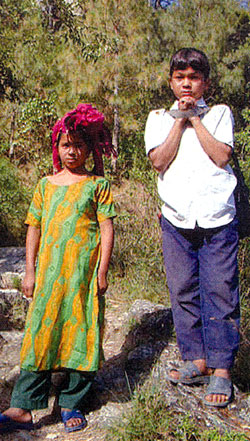"We have suffered enough," says NC district leader Nanda Bahadur Bista of Rukum, "we must make sure the peace process is successful so we don't have to hear the sound of guns and bombs again."
According to Bista's count, 1,500 people of Rukum have died in the past 11 years of war. Of them, 94 percent are men from the ages of 17-40 and most are Dalits and Janjatis. An estimated 4,000 children have been orphaned.
The scars of war are everywhere in the trails leading out to the district capital of Khalanga. In the town itself there are endless stories of suffering from every family of the internally displaced: disappeared family members, bereavement, forced labour, extortion, abductions and rape.
 We run into Grade 7 students Bimala Bohara and Krishna Rokaya (pictured) on the trail on 24 May. They were carrying small bags with just enough food for 15 days. They had been told by the Maoists to gather at a house in Gunjil Dhunga from where they were supposed to go and dig a 'martyr highway' in Rolpa. Krishna,13 was still wearing his school uniform. They had to go because the Maoists' edict was: 'One person per house, otherwise Rs 3,000 fine.'
We run into Grade 7 students Bimala Bohara and Krishna Rokaya (pictured) on the trail on 24 May. They were carrying small bags with just enough food for 15 days. They had been told by the Maoists to gather at a house in Gunjil Dhunga from where they were supposed to go and dig a 'martyr highway' in Rolpa. Krishna,13 was still wearing his school uniform. They had to go because the Maoists' edict was: 'One person per house, otherwise Rs 3,000 fine.'
Since there was no one in Krishna's house except for his mother and baby brothers and sisters, he was compelled to go. His family didn't dare say they couldn't send anyone. Krishna was among about 50 people who marched towards Rolpa that day. Among them was the son of the woman in whose house everyone had gathered. Her Grade 8 son was among those who went. "They say they will return in 15 days," said the mother, "Two days to go, two days to return and the rest to dig the road. I have given him some money so he can buy food to eat. I hope he'll be ok."
She has heard stories of others who have died during road construction or killed in crossfire. "But now there is going to be peace, no?" asks neighbour Lila Rokaya who also had to send her sister who was in Grade 7, "maybe they shouldn't have taken them."
Dil Shobha and Sapana Sunar worked in the highway last year when the Maoists asked for one person from every household. Sapana marched to Rolpa and worked on the road with her one-year-old baby strapped to her back. The Maoists would also make the workers drill, watch cultural programs and sing songs. Both Dil Shoba and Sapana's husbands have married second wives and don't live in the
village anymore.
Not even the brother of the Khalanga representative of the child rights centre, CWIN, was spared. He was forced to work on the highway but was caught up in a firefight and was hit in his leg by an army bullet. Very few people go out of their own free will because of the dangers, the villagers have to go whenever called,
and they have to march for days from their homes before they reach the construction site.
Khadge Buda, 27, of Athbiskot committed suicide last year when the Maoists tried to force him to go work on the highway. After that the women in the village prevented their men folk from going too.
The Maoists say 13km of the 19km road from Tila to Ghartigau is completed. We ask the local Maoist leader Sarun Batha why his party is using children. "When everyone in the village go to work on the highway, the children also join them out of their own free will," he reasons, "after all in many of these households 13-14 year olds have to work in their homes. We let them work according to their capacity."
It is clear the children should not be forced to leave school to work on the road. The Maoists should have tried to convince the people about the importance of the road rather than impose a fine on those who don't send one person for the work gang. This could be counter productive for the Maoists themselves.
There have been positive developments for women in districts like Rukum. Polygamy and untouchability have been virtually eradicated. The Maoists have forced Dalits to enter the houses of upper caste people wearing shoes or forced Thakuris to take water from the village tap from Dalits.
"They have become bolder, they speak out against injustice, they are politically aware," says Dilmaya Pun of Chhing village in Rukum.
But other women admit the negative effects of the insurgency outweigh these benefits. Their complaints mainly centre around being forced to attend mass meetings and work on roads, not being allowed to travel freely to Khalanga and the loss of lives and livelihoods.
"In the last ten years, the lives of many women and children here have been ruined," says Sita Oli, a NC activist, "many have been widowed, women are struggling to survive and the children have a lot of mental stress. This has affected their studies.


